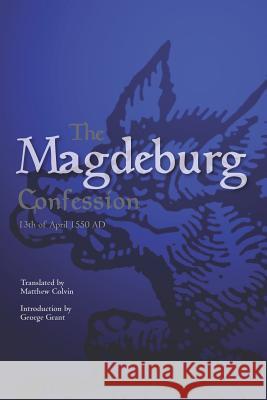The Magdeburg Confession: 13th of April 1550 AD » książka
The Magdeburg Confession: 13th of April 1550 AD
ISBN-13: 9781470087531 / Angielski / Miękka / 2012 / 128 str.
This is the first ever English translation of the historic Magdeburg Confession. The translation work was done from a 1550 Latin original of the Confession. The Magdeburg Confession is the first known document in the history of man to formally set forth the Doctrine of the Lesser Magistrates. The Lesser Magistrate Doctrine teaches that when a superior authority makes unjust laws or decrees, the lesser authority has a God-given right and duty to resist those unjust laws or decrees. In 1548, Charles V imposed his infamous Augsburg Interim which was an attempt to smash the Protestant Reformation. While all of Protestant Germany conformed to his decree, one city decided to take a stand and resist his authority - the city of Magdeburg. The pastors of Magdeburg issued their Confession and Defense of the Pastors and Other Ministers of the Church of Magdeburg on April 13, 1550 AD. Five months after issuing their Confession, Charles V's forces marched on Magdeburg. The people of Magdeburg burned everything outside the city walls and closed the city gates. The siege of Magdeburg had begun. What constitutes a tyrannical government? How and when are Christians to respond and act when a government does become tyrannical? Are Christians to give unlimited obedience to the State? These questions and others were addressed and answered by the pastors in the Confession. In defiance of Charles V's tyranny, they declared, "Divine laws necessarily trump human ones." What the pastors of Magdeburg wrote in the Confession significantly impacted men like John Knox, Theodore Beza and Phillip Mornay. The repercussions of the Confession were felt throughout Western Civilization all the way to the founding of America as a nation. For over 460 years, the Confession has existed only in Latin and German. Now English-speaking people can read it for themselves. This is the first English translation of The Magdeburg Confession ever written. Dr. Matthew Colvin holds a Ph.D. in Latin and Greek Literature from Cornell University.
Zawartość książki może nie spełniać oczekiwań – reklamacje nie obejmują treści, która mogła nie być redakcyjnie ani merytorycznie opracowana.











